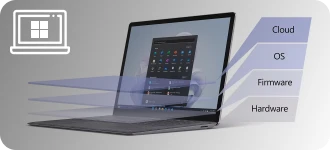Invest in CISO Online™ for unparalleled Website eCommerce Security, where innovation meets reliability

CISO Online™ stands at the forefront of Website and eCommerce security, providing a comprehensive suite of solutions tailored to safeguard your digital storefront. Our arsenal includes DevSecOps, SAST and DAST Security Testing, Vulnerability Assessment, and Penetration Testing, ensuring robust protection against cyber threats.
Our expert team leads the charge in online security, employing DevSecOps to fortify your digital assets against vulnerabilities. Through meticulous SAST and DAST Security Testing, we conduct thorough analyses to identify and mitigate risks, ensuring the resilience of your online platforms.

At CISO Online™, we adopt a holistic approach to Website and eCommerce security, extending our services to encompass Vulnerability Assessment and Penetration Testing. By fortifying your platforms against potential threats, we provide you with peace of mind in an increasingly digital world.
Ignoring cybersecurity safeguards for platforms exposes businesses to significant risks, including data breaches, compromised customer information, and financial losses. The consequences extend from reputational damage to regulatory non-compliance, underscoring the critical necessity of proactive investment in comprehensive cybersecurity strategies.
Our user-friendly interfaces prioritise the safety of your digital assets, ensuring seamless navigation and robust protection for your Website and eCommerce ventures. Stay ahead of evolving cyber threats and fortify your digital storefront with CISO Online’s expertise for a secure online future.


Beyond simply mitigating cyber threats, our mission extends to fostering a culture of cybersecurity awareness within organisations. By instilling a proactive mindset and promoting best practices for endpoint security, we empower businesses to navigate the ever-evolving landscape of cyber risks with resilience. This proactive approach not only enhances operational security but also safeguards reputation, a priceless asset in today’s interconnected world.
Choosing to partner with CISO Online™ signifies a commitment to upholding the security and integrity of your organisation’s endpoint devices. Our tailored solutions and comprehensive approach ensure that you remain protected against the growing threats of malware infections, data breaches, and cyber attacks. With CISO Online™ by your side, you can rest assured that your endpoints are shielded from harm, offering peace of mind in an era where endpoint protection is paramount.
Is your business, organisation, or government entity navigating the complexities of website and e-commerce security? Look no further thanCISO Online™.We’re dedicated to alleviating that burden for you.
Our mission is to safeguard and guide your business towards the right security solutions, informed by thorough vulnerability and security testing reports.


SAST Security Testing
Safeguard Your Website & eCommerce Assets from Code to Deployment with CISO Online’s Advanced Solutions
CISO Online’s Static Application Security Testing (SAST) services are designed to thoroughly analyse the source code of your website and eCommerce applications for potential vulnerabilities.
SAST Benefits
1. Comprehensive Code Analysis
2. Early Detection of Vulnerabilities
3. Customised Security Assessments
4. Actionable Insights and Recommendations
Our advanced SAST tools scan your codebase for security flaws, including common issues like SQL injection, cross-site scripting (XSS), and authentication bypass. By identifying vulnerabilities early in the development process, we help you address security concerns before they escalate into costly breaches or cyber attacks. With our SAST Security Testing, you can ensure that your Website and eCommerce platforms are built on a secure foundation, protecting your customers’ data and your brand reputation.


DAST Benefits:
1. Automated Scanning
2. Black-Box Testing
3. Continuous Vigilance
4. Customised Security Assessments
5. Actionable Insights and Recommendations
Using advanced scanning techniques, we identify vulnerabilities such as injection flaws, broken authentication, and insecure direct object references. By uncovering potential weaknesses in your applications, we empower you to proactively address security risks and fortify your Website and eCommerce infrastructure against cyber threats. With CISO Online’s DAST Security Testing, you can enhance the resilience of your platforms and protect your business from malicious actors.

CISO Online™conducts comprehensive Vulnerability Assessments to identify and prioritise security weaknesses in your infrastructure. The three key benefits organisations experiences when employing a vulnerability include:
Our team of security experts analyses your network configurations, server setups, and application architectures to uncover potential vulnerabilities that could be exploited by attackers.
By assessing the security posture of your Website and eCommerce platforms, we provide actionable insights and recommendations for remediation, helping you strengthen your defences and mitigate security risks effectively. With CISO Online’s Vulnerability Assessment services, you can proactively safeguard your assets and maintain the trust of your customers.



Penetration Testing is a critical component of CISO Online’s Website and eCommerce security strategy. Our penetration testing services involve simulating real-world cyber attacks to evaluate the effectiveness of your security controls and defences.
Using advanced techniques and methodologies, our team of ethical hackers identifies and exploits vulnerabilities in your systems, providing you with a realistic assessment of your security posture. With CISO Online’s Penetration Testing, you can uncover hidden security risks, validate the effectiveness of your security measures, and implement targeted remediation strategies to protect your platforms from cyber threats.

Secure Your eCommerce Future with Microsoft Azure DevSecOps by CISO Online

Here’s how we utilise Microsoft Azure DevSecOps to fortify Website and eCommerce Security:
1. Shift-Left on Security
2. Build Confidence in Supply Chain
3. Deliver in a Secure Platform
4. Manage Access Control
By seamlessly integrating security into every stage of the development lifecycle, we empower your online experience with unparalleled protection against cyber threats. With features like those listed above, we provide comprehensive security measures to safeguard your Website and eCommerce platforms and ensure smooth, safe operations. Partner with CISO Online to fortify your online presence and unlock a future of secure and successful ventures.

Tailored packages for SMB's to uplift cyber security

Risk-based approach for large enterprises to uplift cyber security

Work Security Beyond Boundaries with Microsoft Surface
Website security involves measures and practices aimed at protecting websites from cyber threats, such as hacking, malware, data breaches, and other malicious activities.
Website security is crucial for protecting sensitive information, maintaining user trust, ensuring website availability, and complying with legal and regulatory requirements.
Common threats include SQL injection, cross-site scripting (XSS), cross-site request forgery (CSRF), malware, phishing, distributed denial-of-service (DDoS) attacks, and man-in-the-middle (MITM) attacks.
Implement HTTPS, keep software up to date, use strong passwords, enable multi-factor authentication (MFA), regularly back up data, use firewalls, scan for vulnerabilities, and employ security plugins or services.
HTTPS (HyperText Transfer Protocol Secure) encrypts data transmitted between a user's browser and the website server, ensuring data privacy and integrity. It is essential for protecting sensitive information, such as login credentials and payment details.
An SSL/TLS certificate is a digital certificate that authenticates the identity of a website and enables encrypted connections. You can obtain one from a Certificate Authority (CA) or through automated services like Let's Encrypt.
Use parameterized queries or prepared statements, validate and sanitize user inputs, and employ web application firewalls (WAF) to block malicious requests.
A WAF is a security solution that monitors, filters, and blocks HTTP/HTTPS traffic to and from a web application. It helps protect against common threats, such as SQL injection and XSS attacks.
Validate and sanitize user inputs, use Content Security Policy (CSP) headers, and encode output data to prevent the execution of malicious scripts.
CSRF is an attack that tricks users into performing unwanted actions on a website where they are authenticated. Protect against CSRF by using anti-CSRF tokens, validating HTTP referer headers, and implementing same-site cookies.
Enforce strong password policies, enable multi-factor authentication (MFA), use secure authentication protocols, and store passwords securely using hashing algorithms like bcrypt.
Encrypt sensitive data both in transit and at rest, use secure storage mechanisms, limit access to data, and regularly audit data storage practices.
Regularly scan your website for malware, use security plugins, keep software up to date, limit file uploads, and monitor for unusual activity.
Identify and isolate the affected systems, change all passwords, restore from clean backups, investigate the breach, remove malware, patch vulnerabilities, and notify affected users and authorities as necessary.
Stay informed about relevant laws and regulations (e.g., GDPR, CCPA), implement required security measures, conduct regular audits, and maintain proper documentation.
Security tools and services include web application firewalls (WAF), SSL/TLS certificates, security plugins, vulnerability scanners, malware scanners, and monitoring services.
Regular security audits should be performed at least annually, or more frequently if your website handles sensitive data or experiences significant changes.
Penetration testing involves simulating attacks on your website to identify and fix vulnerabilities. It helps improve security by proactively finding and addressing weaknesses.
Use DDoS protection services, employ rate limiting, use content delivery networks (CDNs), and configure firewalls to block malicious traffic.
Signs of a compromised website include unusual traffic spikes, defaced pages, slow performance, unauthorized changes, and alerts from security tools or users.

